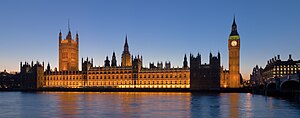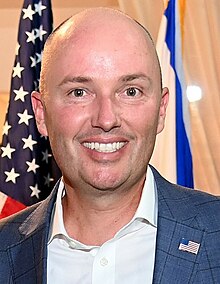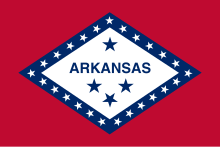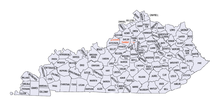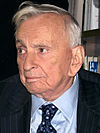
Back Portal:Politik ALS بوابة:السياسة Arabic بوابة:سياسة ARZ Портал:Политика Bulgarian প্রবেশদ্বার:রাজনীতি Bengali/Bangla Portal:Politika BS دەروازە:سیاسەت CKB Portál:Politika Czech Portal:Politik German Portal:Siyaset DIQ
| Main | Topics and categories | Tasks and projects |
The Politics portal
Politics (from Ancient Greek πολιτικά (politiká) 'affairs of the cities') is the set of activities that are associated with making decisions in groups, or other forms of power relations among individuals, such as the distribution of resources or status. The branch of social science that studies politics and government is referred to as political science.
It may be used positively in the context of a "political solution" which is compromising and non-violent, or descriptively as "the art or science of government", but also often carries a negative connotation. The concept has been defined in various ways, and different approaches have fundamentally differing views on whether it should be used extensively or in a limited way, empirically or normatively, and on whether conflict or co-operation is more essential to it.
A variety of methods are deployed in politics, which include promoting one's own political views among people, negotiation with other political subjects, making laws, and exercising internal and external force, including warfare against adversaries. Politics is exercised on a wide range of social levels, from clans and tribes of traditional societies, through modern local governments, companies and institutions up to sovereign states, to the international level.
In modern nation states, people often form political parties to represent their ideas. Members of a party often agree to take the same position on many issues and agree to support the same changes to law and the same leaders. An election is usually a competition between different parties.
A political system is a framework which defines acceptable political methods within a society. The history of political thought can be traced back to early antiquity, with seminal works such as Plato's Republic, Aristotle's Politics, Confucius's political manuscripts and Chanakya's Arthashastra. (Full article...)
Selected article
The Saint-Sylvestre coup d'état was a coup d'état staged by Jean-Bédel Bokassa, leader of the Central African Republic army, and his military officers against the government of President David Dacko on 31 December 1965 and 1 January 1966. Dacko was aware that Bokassa had made plans to take over his government, and countered by forming the gendarmerie headed by Jean Izamo. Bokassa and his men started the coup on New Year's Eve in 1965 by first capturing Izamo and locking him in a cellar at Camp de Roux. They then occupied the capital, Bangui, and overpowered the gendarmerie and other resistance. After midnight, Dacko was arrested and forced to resign from office and then imprisoned at Camp Kassaï. According to official reports, eight people died while resisting the coup. Izamo was tortured to death within a month, but Dacko's life was spared due to foreign intervention. Soon after the coup, Bokassa dissolved the National Assembly, abolished the Constitution and issued a number of decrees, banning begging, female circumcision, and polygamy, among other things. Bokassa initially struggled to obtain international recognition for his regime, but the new government eventually obtained recognition from other African nations.
Featured picture

Located in Victoria, British Columbia, Canada, and officially opened in 1898 with a 500 feet (150 m) long facade, central dome, two end pavilions, and a gold-covered statue of Captain George Vancouver, the British Columbia Parliament Buildings are home to the Legislative Assembly of British Columbia.
Selected quote
Selected biography
Elizabeth II (born 1926) is the constitutional monarch of 16 sovereign states known as the Commonwealth realms, head of the 54-member Commonwealth of Nations, and head of state of the Crown Dependencies and British Overseas Territories. Her father, George VI, acceded to the throne in 1936 on the abdication of his brother Edward VIII. She began public duties during the Second World War, in which she served in the Auxiliary Territorial Service. On George VI's death in 1952, she became Head of the Commonwealth and Queen of seven independent Commonwealth countries: the United Kingdom, Canada, Australia, New Zealand, South Africa, Pakistan, and Ceylon. Her coronation service in 1953 was the first to be televised. Since her accession, the number of her realms has varied as territories gained independence and some realms became republics. In 1947 she married Prince Philip, Duke of Edinburgh, with whom she has four children: Charles, Anne, Andrew, and Edward. Her reign of 72 years is the second-longest for a British monarch; only Queen Victoria has reigned longer. Elizabeth's Silver and Golden Jubilees were celebrated in 1977 and 2002; her Diamond Jubilee is being celebrated during 2012.
Did you know (auto-generated) -

- ... that politics in The Simpsons have caused controversy in Argentina, Australia, Brazil, and Japan?
- ... that William Mackinder was a deep-sea fisherman and millworker before entering British politics, where he advocated for worker's rights?
- ... that María Elva Pinckert, motivated by the murder of her brother, started her political career in local politics in 1999?
- ... that Phyllis Le Cappelaine Burke helped found the Sydney chapter of the St. Joan Social and Political Alliance, which advocated for equal rights for women?
- ... that Jessica Mutch McKay hosted debates between the leaders of New Zealand's two major political parties?
- ... that even though the Legislative Assembly of Quebec ordered a monument of Maurice Duplessis in front of its building, later premiers hid it for 16 years to avoid political tensions?
More did you know...
- ...that the Communist League of America was formed after some members of the Communist Party USA were expelled for Trotskyism?
- ...that four member states of the European Union have de jure opt-outs and do not participate fully in all common policies?
- ...that Cornelius, Oregon is named after pioneer Thomas R. Cornelius, who served in the both the Territorial and State legislatures?
- ...that the Society of the Friends of Peasants had significant influence on the Danish Constitution of 1849?
- ...that the New Zealand McGillicuddy Serious Party wanted to return to a medieval lifestyle and establish a monarchy based on the Scottish Jacobite line?
- ...that the Proletarian Revolutionary Organisation of Nepal proposed a synthesis of Buddhism and Maoism in 1977?
In this month
- July 20, 1944 – an assassination attempt is made on Adolf Hitler with involvement by notable German conservatives.
- July 23, 1952 – The European Coal and Steel Community is established.
- July 27, 1830 – King Charles X of France is overthrown in the French Revolution of 1830, also known as the July Revolution.
- July 31, 1912 – American conservative economist, statistician, and Nobel Prize winner Milton Friedman is born.
News and Current events
- August 11: 4 local government areas in New South Wales, Australia locked down after COVID-19 case
- August 11: Australia: AstraZeneca vaccine access expanded by Victorian government
- August 1: Australia: Victorian lockdown lifted
- July 29: Tunisia's president dismisses prime minister, suspends parliament
- July 25: Australia: Wikinews interviews Reg Kidd, mayor of the City of Orange, about COVID-19 lockdown and local government
- July 23: South Australia enters week-long lockdown to contain COVID-19 Delta variant spread
- July 21: Technological University Dublin senior lecturer Dr Lorcan Sirr speaks to Wikinews on housing market in Ireland
- July 21: Three rural councils in New South Wales, Australia enter 7-day lockdown
- July 21: Australia: Victoria lockdown extended by a week with 85 active cases recorded
- July 15: California governor signs new state budget, eligible Californians to get stimulus payments
Topics and categories
General images
Related portals
Associated Wikimedia
The following Wikimedia Foundation sister projects provide more on this subject:
-
Commons
Free media repository -
Wikibooks
Free textbooks and manuals -
Wikidata
Free knowledge base -
Wikinews
Free-content news -
Wikiquote
Collection of quotations -
Wikisource
Free-content library -
Wikiversity
Free learning tools -
Wiktionary
Dictionary and thesaurus
Sources
More portals
© MMXXIII Rich X Search. We shall prevail. All rights reserved. Rich X Search


